In an India that prides itself on its democracy and diversity, the plight of Adivasi communities, particularly in regions like Nagarhole, Bastar, and Hasdeo exposes a shocking paradox. The historical exploitation and ongoing displacement of these indigenous peoples reveal a grim reality: despite independence from colonial rule, the Adivasis continue to face a relentless assault on their rights, land, and very existence.On September 28, 2024, members of AISA, AILAJ, and other progressive organisations hosted “Voices From The Margins”- a talk featuring Adivasi activists Shivu, Thimma, Soni Sori, and Ramlal Kariyam, focusing on resistance against state violence and displacement. The speakers highlighted the effects of militarization and resource exploitation in Nagarhole, Bastar, and Hasdeo.
Nagarhole: Resisting Displacement and Corporate Exploitation
In the shadow of the Nagarhole Tiger Reserve in Karnataka, the plight of the Adivasi communities, particularly the Jenu Kurubas, exemplifies the ongoing struggle against historical injustices and modern encroachments. Established in 1984, the reserve has subjected the indigenous inhabitants to systematic displacement and exploitation under the guise of conservation. Siva, a resident of the area, recounts how the ruling class has plundered their ancestral lands—referred to as jal-jangal-jameen—for centuries, with the Adivasis bearing the brunt of this relentless assault.
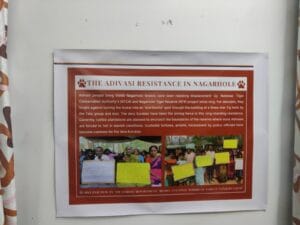
Despite India’s formal independence, the loot of Adivasi lands continues unabated. The government’s efforts to convert Nagarhole into an eco-tourist hotspot through corporate projects, such as the construction of a luxury hotel by the Tata group, have faced fierce resistance from the Jenu Kurubas. Activists like Thimma have been pivotal in mobilizing the community to safeguard their rights and heritage against these exploitative ventures.
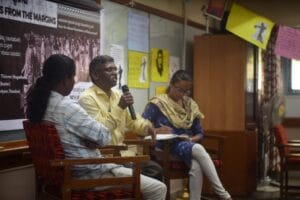
The creation of the tiger reserve has not only displaced communities but has also severed their connection to traditional livelihoods such as fishing, hunting, and gathering forest resources. The dismal state of “line houses” provided to the displaced is a glaring reminder of the state’s failure to offer meaningful rehabilitation, effectively imprisoning Adivasis in structures devoid of cultural significance. Furthermore, organizations like the Wildlife Conservation Society (WCS) and World Wildlife Fund (WWF) have been criticized for promoting conservation policies that marginalize indigenous peoples in the name of environmental protection.
The resilience of the Adivasi communities remains unyielding, as they continue to vow to protect their ancestral lands. Siva and his community’s struggle is a testament to their unwavering commitment to resisting displacement and asserting their rights against an ever-encroaching state.
Bastar: A War Zone for Adivasi Rights
In the conflict-ridden region of Bastar, Chhattisgarh, the Adivasi communities face a brutal onslaught under the pretext of combating Maoism. Veteran activist Soni Sori, a survivor of state-sponsored violence herself, sheds light on the harrowing experiences faced by these indigenous populations. The Indian government’s military operations, such as Operation Green Hunt and Operation Samadhan Prahar, have been employed to justify the systematic killings, rapes, and brutalization of Adivasi people in the name of restoring law and order.
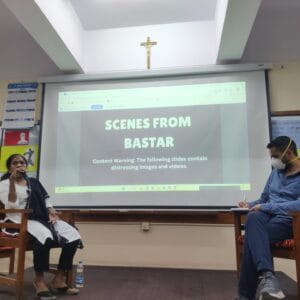
Bastar’s rich mineral reserves have attracted corporate giants like Adani, who, in collusion with state forces, perpetuate violence against innocent villagers.
In an anti-Naxal operation on April 2, 2024, security forces in Bastar, Chhattisgarh, claimed to have killed 13 individuals, including Adivasi villagers, in what they described as a major success against Maoists. Among the deceased was Kamli Kunjam, a young deaf woman, who was forcibly taken from her home by police while her family protested. Her mother and grandmother recounted how Kamli was dragged into the forest, with claims that she suffered abuse. The following day, her family found her bangle in the woods, prompting a desperate search. The police insist Kamli was a Maoist, a claim her family vehemently denies, emphasising her disability.

Activists like Soni Sori highlight the ongoing violence against Adivasi communities, particularly women, citing historical instances of police brutality, sexual violence, and unjust killings. In recent years, civilian casualties have surpassed those of both Maoists and security forces in the region. With the approaching elections, the insurgency remains a significant political issue, exacerbated by intensified military actions under the current BJP government. This situation raises critical questions about human rights and the safety of Adivasi populations amidst escalating state violence.
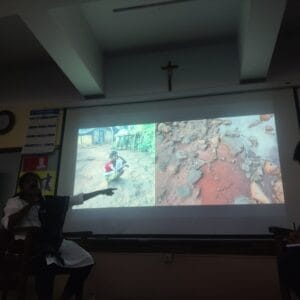
With over 200 killings reported this year alone, many victims have been innocent civilians caught in the crossfire of a violent state apparatus. The dehumanisation of Adivasis is evident as they are unjustly labelled as Naxalites, while their actual struggles for land and dignity are brushed aside by a government more interested in appeasing corporate interests. Soni Sori’s call for awareness is a crucial reminder of the urgency for social justice and the need to stand in solidarity with those resisting the state’s violent repression.
Hasdeo: The Fight for Survival and Environmental Justice
The Hasdeo forests, one of India’s largest remaining forest tracts, are facing unprecedented destruction due to corporate mining interests. Since 2021, over 157 hectares of biodiversity-rich land have been cleared to extract coal for the Rajasthan Rajya Vidyut Utpadan Nigam, operated by the Adani Group. Activists like Ramlal Kariyam from the Hasdeo Aranya Bachao Sangharsh Samiti have taken a stand against these destructive practices, advocating for the rights of the indigenous families who depend on the forest for their livelihoods.
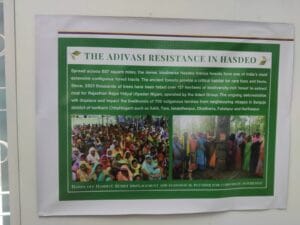
The ongoing deforestation threatens to displace countless families in Surguja district, further exacerbating the cycle of poverty and displacement. The indifference of the government to the suffering of Adivasi communities is starkly evident as they prioritise corporate profits over the well-being of their citizens. The harsh realities faced by these communities—depleted water sources, loss of livelihoods, and environmental degradation—are met with systematic violence from state forces, who continue to facilitate corporate expansion.

In Hasdeo, the fight against corporate encroachment is not just about land; it is about survival. The voices of Adivasi activists echo through the forests, reminding us of their unwavering spirit and determination to protect their ancestral lands against exploitation. Ramlal Kariyam’s activism serves as a beacon of hope, as he, along with his community, continues to resist the forces that seek to erase their existence in pursuit of profit.
The narratives of Siva, Soni Sori, and Ramlal Kariyam remind us of the urgent need to recognize and support the Adivasi resistance against state and corporate oppression.



















































































